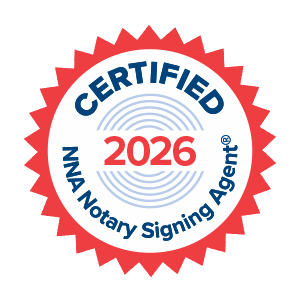

Real estate closings require precision, timing, and proper notarization of multiple documents to legally transfer property ownership. Lake Mead Mobile Notary provides mobile notarization for real estate closings, working with buyers, sellers, agents, escrow officers, and title companies to ensure a smooth, compliant closing.
Whether you're finalizing a home purchase, sale, or cash transaction, we'll meet you at your home, title office, or another location for an efficient and secure signing experience.
Prices shown before any venue parking fees or special access requirements. Exact totals are displayed in the booking portal before you confirm.
Ensure a smooth, professional, and secure closing with our expert mobile notary service.
Book AppointmentAn authorized representative is a person designated by the employer to complete Section 2 of Form I-9 by physically examining the employee's identity and employment authorization documents, verifying their authenticity, and certifying that the documents appear genuine and relate to the employee presenting them. The authorized representative can be any individual over 18 years old, including mobile notaries, HR professionals, third-party service providers, or even other employees within the organization—the employer determines who is authorized to act on their behalf. However, the employer retains full legal liability for any errors, omissions, or violations on I-9 forms completed by their authorized representative, making proper training and reliable service providers critical to compliance.
Federal law does not require authorized representatives to have special training, licensing, or certification, but employers must ensure their representatives understand I-9 requirements, acceptable document lists (List A, B, and C), fraud detection basics, and anti-discrimination rules that prohibit requesting specific documents or rejecting valid documentation based on national origin or citizenship status. Many employers use mobile notary services as authorized representatives because notaries are already trained in identity verification, document examination, and record-keeping practices that align with I-9 compliance standards. The authorized representative must be physically present with the employee during Section 2 completion—remote verification via video is only a temporary accommodation through December 2025 and still requires subsequent physical inspection.
Lake Mead Mobile Notary serves as a trusted authorized representative for I-9 verification throughout Las Vegas, Henderson, North Las Vegas, and Boulder City, providing professional document examination services for employers with remote workers, multi-location operations, or limited HR staff. Our mobile notaries travel to employee locations—home offices, co-working spaces, or any convenient site—complete Section 2 verification with proper physical document inspection, and provide employers with compliant, audit-ready I-9 forms. This service eliminates the burden of coordinating internal authorized representatives, reduces employer liability through professional verification, and ensures every I-9 meets federal standards that withstand ICE audits.
Out-of-state buyers have three primary options for closing when they cannot attend in person: Remote Online Notarization (RON), local notarization in their home state, or coordinating a mobile notary to travel. Remote Online Notarization is increasingly accepted by title companies and Nevada lenders, allowing the buyer to sign and notarize documents via secure video call from anywhere, eliminating the need for travel or complex multi-state coordination.
Option 1: Remote Online Notarization (RON) ⭐ Recommended
Option 2: Home State Notarization (More Complex)
Option 3: Notary Travel (Premium Option)
✅ Best Practice for Nevada Property Buyers:
Early communication is critical. Contact your title company within days of purchase agreement to confirm they support Remote Online Notarization. Many do. If your title company doesn't support RON, explore Option 2 with their guidance on apostille requirements. Lake Mead Mobile Notary provides real estate closing coordination, connecting out-of-state buyers with certified notaries in Las Vegas and Summerlin to streamline closing timelines.
Most title companies require using their own notaries for real estate closings to maintain chain of custody, ensure compliance with specific lender instructions, and manage liability. While your own notary is legally valid in Nevada, title companies contractually mandate their selected notaries. Using an unauthorized notary can lead to rejection, closing delays, or escrow complications.
Why Title Companies Insist on Their Notaries:
Title companies coordinate with lenders, insurers, and county recorders—all of whom have specific requirements. They need notarization consistency and direct communication with the notary handling your closing. They also carry errors & omissions (E&O) insurance that covers their contracted notaries, which may not apply to independent notaries.
🔑 Can You Use Your Own Notary?
In rare cases, yes—but only with prior written approval from:
📋 Legitimate Reasons for Exception Requests:
⚠️ Best Practice:
Always disclose your preferred notary to the title company early in the transaction. Get written approval in advance. If they refuse and delays occur, professional notaries in Summerlin and Water Street can coordinate with title company staff to facilitate acceptance or serve as backup if needed.
If a county recorder rejects your deed due to improper notarization (wrong date, missing notary signature, incorrect venue, incomplete acknowledgment language), the remedy is typically re-notarization of the same deed rather than drafting an entirely new document. Minor errors in the notarial certificate can sometimes be corrected through amendment; major errors require the grantor to re-sign and have the document re-notarized.
Typical Fixes (No New Deed Needed):
✅ Re-notarization with corrected certificate attached
✅ Corrective affidavit prepared by notary explaining & curing the error
✅ Notary amendment striking through incorrect information and initialing corrections
✅ New notarial certificate on same deed (notary signs and dates the new certificate)
❌ When You May Need a New Deed:
🏠 Next Steps:
Contact your title company immediately with the recorder's rejection letter. They'll advise whether a re-notarization, corrective affidavit, or new deed is required. Professional real estate closing notaries in Henderson and Downtown Summerlin provide same-day or next-business-day re-notarization to prevent closing delays.
County recorders will reject documents with notarization errors—dates, signatures, venue, or acknowledgment language—rendering your document invalid for recording. Correction depends on severity: minor errors in the certificate might be fixed with corrections initialed by the notary; major errors usually require re-notarization with both parties present.
Common Notary Mistakes That Cause Rejection:
🔧 How to Fix It:
If the error is typographical on the certificate, the original notary may correct it by striking through and adding the accurate information, then initialing and dating. However, most county recorders require re-notarization to ensure legal compliance. Contact your title company or the recording office immediately to determine the specific fix needed for your document.
🚀 Expedited Re-Notarization:
Mobile notaries offer same-day or next-day re-notarization appointments throughout Henderson and Downtown, preventing further delays. Professional notarization services ensure accuracy on first attempt, saving time and frustration.
Yes, Lake Mead Mobile Notary regularly coordinates with estate planning attorneys during Lake Las Vegas trust and estate document signings. Many attorneys prefer to attend complex trust executions—particularly for irrevocable trusts, family trust systems, or estates exceeding several million dollars—to ensure proper execution and answer last-minute client questions. We schedule appointments to accommodate your attorney's availability and provide sufficient time for attorney oversight.
Common coordination scenarios include: attorney attends in-person at your Lake Las Vegas residence or resort for complete signing ceremony; attorney provides remote guidance via phone/video during signing; attorney reviews documents immediately before appointment and confirms readiness to sign; attorney provides detailed execution instructions we follow precisely during notarization.
When booking, inform us if your estate planning attorney will be present or providing guidance. We allocate appropriate time (typically 60-90 minutes for attorney-supervised signings versus 30-45 minutes for standard trust signings). Many Henderson and Las Vegas estate planning attorneys working with Lake Las Vegas clients appreciate mobile notary coordination because it eliminates the need for clients to travel to law offices while maintaining professional oversight.
Important distinction: We execute documents according to attorney instructions and Nevada notary law requirements, but we cannot provide legal advice about trust provisions, tax implications, or estate planning strategies. All substantive questions about your trust should be directed to your attorney either before or during the signing appointment. Our role is proper legal execution and notarization compliance.












